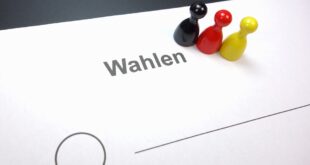Embracing Political Differences: Why a Debate and Understanding Culture is Necessary
When it comes to politics, people have varying beliefs, different ideologies, and various positions on the same issues. While some might emphasize the importance of liberalism, conservatism, progressivism or nationalism, others have a completely different opinion. The reality is that political views are fluid, and most people’s opinions shift across their lifetime as they gain more experiences and insights into life’s different aspects.
However, such diversity of opinion has led to debates and sometimes misunderstandings. Many are afraid to engage with opposing political views out of fear of disagreement or even hostility. The key mindset to maintain here is not that disagreement is some sort of hindrance to politeness, but rather that disagreements are worth discussing to come to some understanding.
The Importance of Discussion and Debate
Engaging in healthy debate and discussion ought to always be encouraged. Open dialogue leads to an understanding between people who may naturally have different view about a topic. While not all debates will end amicably, taking the time to talk through differences in perspective contributes to inclusive debates.
Encouraging a debate culture is essential – this consists not only of allowing opposing viewpoints but considering them equally important in public debate. Such an approach drives a broad analysis and study of policies that address different groups of people facing different situations. Through soliciting different political perspectives and opinions, we can gain a better understanding of issues and the different solutions available.
Simultaneously, learned discussions prompt practicing tenants of democracy unifying that would drive decision-making in a polity, and consequently, reassuring public trust in the fundamental infrastructure of the society.
The Role of Understanding
Understanding among groups is not only necessary during elections, but it’s especially essential following elections. Promoting a better understanding through continuous communication practices, that come apart from toxic social and political status quo associated with winner-takes-all methodology has never lately seemed more challenging. One of the most effective ways to do this is by listening to different political perspectives, even when you fundamentally agree or unsupported by that position fully.
In today’s climate, the insistent struggle that seems to kick against notion empathy and defending tough stand wearing dogma as codes of courage more naturally and drastically exacerbates the state of discord in society, country, and the world alike.
Since politics reflect human experience, people can have vastly different experiences calling for focus on understanding. By attempting to operate from a constant position and demand for empathizing and sensitivity in interpreting experiences different from their own politicians can help people appreciate the nuances in various culture by a coming point of exploration.
The Reality Beyond Worldviews
The dystopian media portrayals show politically-directed poisonous groups all over—even among close relationship friends and the dislike towards opposing supporters. Though anger and disappointment are inseparable from nearly any election, honestly, a collective interest has never seemed disconnected and polarized based on divisive rhetoric. Despite party association or the absence of it or different worldviews it helps to know that, disagreements don’t particularly emerge from unreasonable corner.
Opinions held by opposing sides reflect genuine beliefs from experience, set of learned principles over several domains or aspirations for the world, culminating into distinct policies seen as intriguing electoral buildups. Out of such realization and recognizing it might have implications for both sides, the politics is currently essential that debates need to focus beyond disagreements, infusing regional perspective or situation while encouraging various positions for political sustainability.
The vitality in learning is how democracies seed retention and collective memory nurture stabilizing dialogues to serve as springboards for sustainable political progress while identifying new challenges, utilizing workable policies arranged on some social or community standards.
Conclusion: Making Debate and Understanding Vital Ends
As times are continuing to change, so is the political topography where different political perspectives interconnect. Therefore, problematic tensions consequently arise shaping partisan cleavage along sides those holding distinctive ideas about events, resulting in public resistances about implementing.
While yet advocating a friendly resolution among conflicting ideas, this points to the strongly moving starting argument to engage different ideologies with tact, empathy, and commonsensical uttering to explore agreement for sustained policy good. Politicians, leadership cohorts and the parties alike, in addition, have a patently recognized obligation to prompt such conversation spurring interpretation should ideally resound with people’s places and institutional frame-walks that define public trust to indeed shape political progress to shape reforms.
 Mind Uncharted Explore. Discover. Learn.
Mind Uncharted Explore. Discover. Learn.

